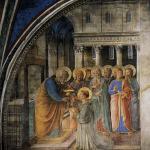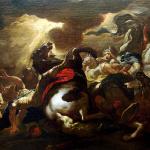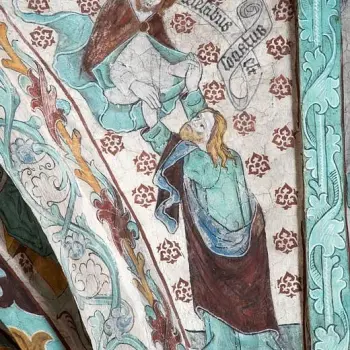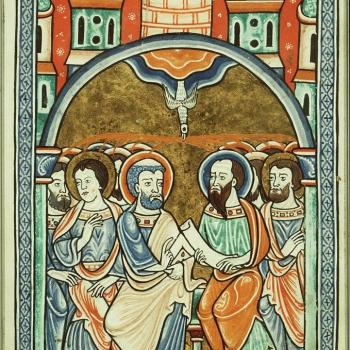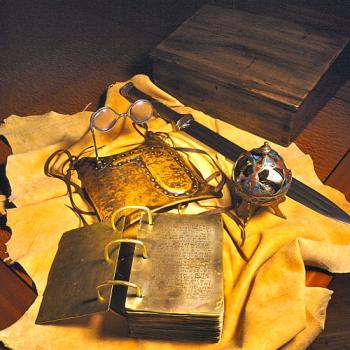Continuing personal study from Acts 6, because Acts 7 begins right in the middle of the story of Stephen’s illegal trial! All the elders and scribes have seen Stephen’s glowing, angelic face and couldn’t resist his words.
They also brought witnesses to testify what Stephen supposedly said. And that’s where Acts 7 begins—with the high priest asking if the false witness testimony was true.
All the references to Greek definitions are from Bible Hub.
Acts 7
1 Then said the high priest, Are these things so?
2 And he said, Men, brethren, and fathers, hearken; The God of glory appeared unto our father , when he was in Mesopotamia, before he dwelt in ,
Why men, brethren, and fathers?
From Bible Hub’s Strong’s Concordance:
The Greek word for Men denotes a “male human being; a man, husband.”
The Greek word for brother denotes a brother used as “a believing brother, member of the same religious community, especially a fellow-Christian.”
The Greek word for fathers denotes a father used as “Heavenly Father, ancestor, elder, or senior. One who imparts life and is committed to it; a progenitor, bringing into being to pass on the potential for likeness.”
Abraham
Abraham means “exalted father, father of a multitude.”
Charran/Haran means “crossroads, a junction of trading routes.”
“The God of glory” evokes such imagery in my mind! What does that phrase mean to you?
3 And said unto him, Get thee out of thy , and from thy kindred, and come into the land which I shall shew thee.
“Get thee out” and “Come.”
“Get thee out” reminds me of people cast out of one place to another. This removal done at the Lord’s command is for salvation rather than damnation.
The Greek word for “get out” is “to go or come out of.” Another verse using this word is John 8:42, “Jesus said unto them, If God were your Father, ye would love me: for I proceeded forth and from God; neither came I of myself, but he me.”
Abraham forsook all and followed juxtaposed to the disciples who recently, in the Garden of Gethsemane, forsook all and fled.
4 Then came he out of the land of the , and dwelt in Charran: and from thence, when his father was dead, he removed him into this land, wherein ye now dwell.
God re-moved Abraham again.
Do I allow God to lead me? Does God lead me? What are my expectations for how and when God leads me? When is the last time I felt His guiding hand in my life? What resulted from that guidance?
5 And he gave him none inheritance in it, no, not so much as to set his foot on: yet he that he would give it to him for a possession, and to his seed after him, when as yet he had no child.
What promises has God made to me that remains as yet unfulfilled? What inheritance am I promised? Where is my promised land?
6 And God spake on this wise, That his seed should in a strange land; and that they should bring them into , and entreat them evil four hundred years.
“Bring them into bondage” refers to “enslave or bring under subjection focusing on the status of being a bond-slave.”
I love numbers. 400 years could mean “universality, total inclusiveness.” 400 years is 40% of God’s day, 1,000 years.
Why did God not just “fix” Abraham’s homeland to avoid this complication? What does the Lord want me to learn from this?
7 And the nation to whom they shall be in bondage will I judge, said God: and after that shall they come forth, and serve me in this place.
We know for the children of Israel, this nation is Egypt. And they return to the promised land of Canaan.
The Greek word for “nation,” though, connotes “the heathen world, Gentiles, a race distinct from Israel.”
8 And he gave him the covenant of : and so Abraham begat Isaac, and circumcised him the eighth day; and Isaac begat Jacob; and Jacob begat the twelve .
Have you studied the covenant of circumcision? What does it signify? How does it apply to women? It’s worth your time to spend some time on it.
Isaac means “he laughs.”
8 means “one of eight with seven others.” For me it means rebirth and regeneration.
Jacob means “heel or seizing by the heel, supplanting, to follow, to overreach.”
12 is two and ten, three fours, eight and fours, two sixes. What does 12 mean to you?
Patriarchs refer to founders of family, a beginning.
Joseph
9 And the patriarchs, moved with , sold into Egypt: but God was with him,
“Moved with envy.” I loved this word in the Greek. It means to be jealous but conversely, it could be zealous in the pursuit of good. Scriptures with the phrase “jealous God” came to mind. So burning with hatred or anger could be desire earnestly or strive after. Unfortunately/fortunately for Joseph, his brothers were the angry kind.
Joseph means “he increases, to add.” Reminds me of multiplied from Acts 6.
Emmanuel is “God with us.”
10 And him out of all his , and gave him favour and wisdom in the sight of Pharaoh king of Egypt; and he made him governor over Egypt and all his house.
The Greek word for delivered means to “I rescue, I remove.” Joseph and Abraham were both removed.
How did God deliver Joseph? Joseph’s brothers sold him and he ended up a slave. He fled from Potiphar’s wife and still landed in jail. He helped the butler and butcher but remained forgotten. It’s been important for me to see the hand of God delivering me even in the unexpected results of trying to do the best I can.
11 Now there came a over all the land of Egypt and Chanaan, and great affliction: and our fathers found no sustenance.
Jesus Christ is the only sustenance I find during spiritual famines.
12 But when Jacob heard that there was in Egypt, he sent out our fathers first.
The Greek word for corn is grain or wheat. Jesus is the Bread of Life.
Number awareness, first time. They got wheat, an initial comfort.
13 And at the second time was made known to his brethren; and Joseph’s kindred was made known unto .
Second time. Truth was made known, a second comfort.
14 Then sent , and called his to him, and all his kindred, threescore and fifteen souls.
70 and 5 souls. The Greek usage of five here “is derived from the associations that five has when used in reference to the Tabernacle, Temple, etc, meaning redemption by grace.” Seventy is combined from seven and 10. Seven may signify “God’s perfect, finished work” and ten could mean “completion, responsibility, law.”
Genesis 46:27 says Jacob’s house was 70 souls after a list of their names. How do you account for the discrepancy?
15 So Jacob went down into Egypt, and died, he, and our fathers,
“Went down” in the Greek’s usage is “I go down, come down, either from the sky or from higher land, descend.”
16 And were carried over into Sychem, and laid in the sepulchre that Abraham for a sum of money of the sons of Emmor the father of Sychem.
17 But when the time of the promise drew nigh, which God had sworn to Abraham, the people grew and multiplied in Egypt,
Time of promise? 400 years.
Multiplied.
Moses
18 Till another arose, which knew not Joseph.
19 The same dealt subtilly with our kindred, and evil entreated our fathers, so that they cast out their young children, to the end they might not live.
Cast out that they might not live.
20 In which time Moses was born, and was , and nourished up in his father’s house months:
Moses means “drawn out or born.”
Why does it matter that he was “exceeding fair?”
3 months.
21 And when he was cast out, Pharaoh’s daughter took him up, and nourished him for her own .
Cast out.
Took him up. This verb is “take up, take away, make an end, to own, to value for myself.”
Nourished is “brought up.”
22 And Moses was in all the wisdom of the Egyptians, and was mighty in words and in deeds.
23 And when he was full years old, it came into his heart to visit his the children of Israel.
Full 40 years.
24 And seeing one of them suffer wrong, he defended him, and avenged him that was , and the Egyptian:
25 For he supposed his brethren would have how that God by his hand would them: but they understood not.
26 And the next day he shewed himself unto them as they strove, and would have set them at one again, saying, Sirs, ye are brethren; why do ye one to another?
27 But he that did his neighbour wrong thrust him away, saying, Who made thee a and a judge over us?
28 Wilt thou kill me, as thou diddest the Egyptian yesterday?
29 Then Moses at this saying, and was a stranger in the land of Madian, where he begat two .
Forsook all and fled.
Midian was settled by a son of Abraham and Keturah.
Two sons.
30 And when forty years were expired, there appeared to him in the wilderness of mount Sina an of the Lord in a flame of fire in a bush.
40 years. Again, one meaning of 40 could be “full-testing period…that is the full time (of a crisis) needed to successfully pass through to know God’s approval.”
The word for fire can mean “fire, the heat of the sun, lightning, strife, trials, the eternal fire, Spirit of God.”
Bush here signifies a bramble or thorn bush and reminded me of the crown of thorns.
31 When Moses saw it, he wondered at the : and as he drew near to behold it, the of the Lord came unto him,
Sight. This indicates a vision.
The Lord. It’s interesting to me that this word denotes “an owner or master exercising full rights.”
32 Saying, I am the of thy fathers, the God of Abraham, and the God of Isaac, and the God of Jacob. Then Moses trembled, and durst not behold.
I AM.
33 Then said the Lord to him, Put off thy shoes from thy feet: for the place where thou standest is holy ground.
“Put off” can be translated as “loose, let go, release, unbind so something no longer holds together, release what has been held back.”
34 I have seen, I have seen the affliction of my people which is in Egypt, and I have heard their groaning, and am come down to deliver them. And now come, I will send thee into Egypt.
Come down.
“To deliver” is the same verb “to take out, remove, and rescue” as before.
Come.
Send thee (as a messenger. An angel is also a messenger.)
35 This Moses whom they refused, saying, Who made thee a ruler and a judge? the same did God send to be a ruler and a by the hand of the angel which appeared to him in the bush.
The people rejected Moses, just like they rejected Jesus. I’m a member of the House of Israel. Do I reject any of the message?
36 He them out, after that he had shewed wonders and signs in the land of Egypt, and in the Red sea, and in the wilderness forty years.
Brought out is “lead out.”
Bible Hub’s Strong’s Concordance says this about “signs.” “A sign (typically miraculous), given especially to confirm, corroborate or authenticate. Sign then emphasizes the end-purpose which exalts the one giving it. Accordingly, it is used dozens of times in the New Testament for what authenticates the Lord and His eternal purpose, especially by doing what mere man cannot replicate or take credit for.”
40 years.
37 ¶ This is that Moses, which said unto the children of Israel, A shall the Lord your God raise up unto you of your brethren, like unto me; him shall ye hear.
The Book of Mormon identifies this prophet.
How is Joseph like Moses?
Do I hear him?
38 This is he, that was in the church in the wilderness with the angel which spake to him in the mount Sina, and with our fathers: who received the lively to give unto us:
What are the living oracles? Ten Commandments? The Old Testament scriptures he wrote? A Person(s)?
39 To whom our fathers would not , but thrust him from them, and in their hearts turned back again into Egypt,
They refused to sanctify themselves to see God and come into His presence, which was Plan A.
40 Saying unto Aaron, Make us to go before us: for as for this Moses, which brought us out of the land of Egypt, we wot not what is become of him.
Aaron has an unknown meaning, possibly high mountain.
41 And they made a in those days, and offered sacrifice unto the idol, and rejoiced in the works of their own hands.
They refused God and made their own god. Are they alone in this? Cain made a polluted sacrifice and rejoiced in his works. Who else?
Why a calf? Why is the calf/bull/cow used in sacrifices? Facsimile 2 has a cow on it.
42 Then God turned, and them up to worship the host of heaven; as it is written in the book of the prophets, O ye house of Israel, have ye offered to me slain beasts and sacrifices by the space of forty years in the wilderness?
40 years.
43 Yea, ye took up the tabernacle of Moloch, and the star of your god Remphan, figures which ye made to worship them: and I will carry you away beyond Babylon.
Took up.
Moloch was the god of the Ammonites was hollow with an ox head and outstretched human arms. The people heated the idol Moloch internally and then put children on its outstretched arms to slowly burn to death while drummers beat drums to drown out the victims’ cries.
Remphan was the deification of Saturn.
Babylon defined is “Gate of the Gods.”
44 Our fathers had the tabernacle of witness in the wilderness, as he had appointed, speaking unto Moses, that he should make it according to the that he had seen.
Tabernacle of witness or testimony juxtaposed to the tabernacle of Moloch.
Wilderness is deserted, barren, desolate, uncultivated, not a Garden. Jesus went into the wilderness. Lehi went into the wilderness. Abraham went into the wilderness. Moses, King Mosiah, Alma went into the wilderness. John the Baptist preached in the wilderness. The Lord called His latter-day Church out of the wilderness. What does wilderness mean to you?
Moses had a vision showing him the tabernacle. He created it according to the vision.
Joseph Smith and his counselors saw the Kirtland temple in vision as promised by the Lord.
“Therefore, let it [the temple] be built after the manner which I shall show unto three of you, whom ye shall appoint and ordain unto this power. And the size thereof shall be fifty and five feet in width, and let it be sixty-five feet in length, in the inner court thereof. And let the lower part of the inner court be dedicated unto me for your sacrament offering, and for your preaching, and your fasting, and your praying, and the offering up of your most holy desires unto me, saith your Lord. And let the higher part of the inner court be dedicated unto me for the school of mine apostles, saith Son Ahman; or, in other words, Alphus; or, in other words, Omegus; even Jesus Christ your Lord. Amen. ” Doctrine & Covenants 95:14-17
“President Frederick G. Williams said they knelt together in prayer, and a model of the building ‘appeared within viewing distance. … After we had taken a good look at the exterior, the building seemed to come right over us.’ When the temple was completed, Frederick G. Williams said it looked exactly as it had in the vision.”
David
45 Which also our fathers that came after brought in with into the possession of the Gentiles, whom God drave out before the face of our fathers, unto the days of David;
Jesus means “Yahweh is Salvation, deliver, rescue.”
David means “beloved one.”
46 Who found favour before God, and desired to find a tabernacle for the God of Jacob.
Solomon
47 But Solomon built him an house.
Solomon means “complete, requite, and peace.”
48 Howbeit the most High not in temples made with hands; as saith the prophet,
49 Heaven is my , and earth is my footstool: what house will ye build me? saith the Lord: or what is the place of my rest?
Earth is the same word for the holy ground Moses removed his shoes for.
What house am I building?
“Organize yourselves; every needful thing, and establish a house, even a of prayer, a house of fasting, a house of faith, a house of learning, a house of glory, a house of , a of God;” (Doctrine and Covenants 109:8).
50 Hath not my hand all these things?
Yes! He created all things.
The Stiffnecked
51 ¶ Ye and in heart and ears, ye do always the : as your did, so do ye.
Uncircumcised juxtaposed to the covenant of circumcision and the patriarchs.
The Greek word for “resist: could be translated as to fall against, strive against, oppose, actively resist like someone trying to crush an adversary in battle.”
52 Which of the prophets have not your fathers ? and they have slain them which shewed before of the coming of the Just One; of whom ye have been now the betrayers and murderers:
I don’t know the spiritual status of the folks Stephen addressed. But this verse reminded me of the dire warning Alma gave to Corianton.
“Know ye not, my son, that these things [sexual sins] are an abomination in the sight of the Lord; yea, most above all sins save it be the shedding of innocent or denying the Holy Ghost?
For behold, if ye the Holy Ghost when it once has had place in you, and ye know that ye deny it, behold, this is a sin which is ; yea, and whosoever murdereth against the light and knowledge of God, it is not easy for him to obtain ; yea, I say unto you, my son, that it is not easy for him to obtain a forgiveness. (Alma 34:5-6).”
53 Who have received the law by the disposition of , and have not it.
Disposition is ordination or ordinances! “Properly, thoroughly set in place by the Lord.”
54 ¶ When they heard these things, they were to the heart, and they gnashed on him with their teeth.
Cut to the heart in the Greek is to “saw asunder, cut all the way through.”
Gnashing on him with their teeth? This is an image I just don’t get. I can’t imagine grabbing someone and biting them. Gnashing of teeth is certainly a well-used description of the damned.
“The lord of that servant shall come in a day when he looketh not for him, and in an hour that he is not aware of, And shall cut him asunder, and appoint him his portion with the hypocrites: there shall be weeping and gnashing of teeth” (Matthew 24:50-51).
Stephen
55 But he, being full of the , looked up steadfastly into heaven, and saw the of , and on the of God,
Looked steadfastly sounds like an eye single and one of my favorite scripture passages.
“And if your eye be to my , your whole bodies shall be filled with light, and there shall be no darkness in you; and that body which is filled with light all things.
Therefore, yourselves that your become to God, and the days will come that you shall him; for he will unveil his face unto you, and it shall be in his own time, and in his own way, and according to his own will” (Doctrine and Covenants 88:67-68).
The children of Israel refused to see God. But Stephen, sanctified, experienced exactly what he’d been teaching. He’d kept the covenant of circumcision and built a tabernacle of witness. He looked to God for deliverance, even as he was about to be re-moved from life.
Do I believe it’s possible for me?
56 And [he] said, Behold, I the heavens , and the standing on the right of .
“See” connotes “look at, behold, experience, discern, partake of.”
57 Then they cried out with a loud voice, and stopped their ears, and ran upon him with one accord,
This is so visual for me. The shrieking attempts to not hear and the unanimous murderous intent honestly bring to my mind the image of Legion in swine catapulting over the edge of a cliff. Instead, these elders, with their authority, cast out Stephen and stone him.
58 And cast him out of the city, and stoned him: and the witnesses laid down their at a feet, whose name was Saul.
Saul who becomes Paul.
59 And they , upon , and saying, Lord Jesus, receive my .
60 And he kneeled down, and with a loud voice, , lay not this sin to their . And when he had said this, he fell asleep.
Receive/Accept/Take my spirit. Calling upon God. Kneeled down. Cried with a loud voice. Forgive them.
Stephen, full of the Holy Ghost proclaimed the Father’s plan and testified of the Father and the Son. His record confirms so many possibilities.
And like Abinadi who, in fulfilling the will of the Lord, sacrificed his life for Alma’s conversion, Stephen sacrificed his life for Paul’s unique path and our own possibilities, possibilities he experienced himself.


